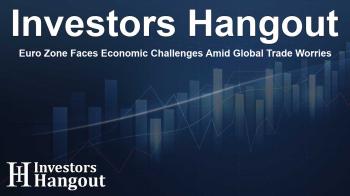Euro Zone Faces Economic Challenges Amid Global Trade Worries

Euro Zone Economy in Troubling Times
The euro zone has been navigating through challenging waters, and the end of 2024 has highlighted some persistent struggles. Various key indicators signal that the hoped-for recovery remains elusive, while trade concerns loom large over the region.
Declining Economic Indicators
Recent data from the European Commission revealed that the sentiment indicator for December fell more steeply than anticipated. This decline in confidence is compounded by a significant drop in German industrial orders and unexpected decreases in retail sales in Germany. Such trends indicate that the 20-nation currency bloc is not experiencing the growth many hoped for.
Potential Threats to Trade
The ongoing trade tensions further complicate the euro zone's economic landscape. Fresh concerns about potential tariffs on exports from the incoming administration could pose serious challenges for businesses across the bloc. As a result, the predictions suggest stunted growth, with some economists speculating that Germany, the euro zone's largest economy, may have experienced negative growth yet again.
Lingering Effects of Energy Prices
The economic picture has been bleak since energy prices soared due to geopolitical conflicts, specifically following Russia's invasion of Ukraine. This event inflicted lasting damage on various industrial sectors, leading to continuing struggles as they grapple with elevated inventory costs and supply chain disruptions.
What's Next for the Euro Zone?
Economic experts continue to express concern regarding the outlook for the euro zone. Leo Barincou from Oxford Economics articulated that the recently unveiled Economic Sentiment Indicator points to potential downsides and questions the forecast for moderate GDP growth in the upcoming months. “There appears to be no bright spot visible for the euro zone economy,” he noted.
Consumer Spending and Its Consequences
While there was a glimmer of hope for consumer spending to propel recovery, the latest data suggests that such aspirations may be overly optimistic. Private consumption was expected to rebound due to improved real incomes, yet a report from the European Central Bank indicated that households are likely to maintain a higher savings rate. This behavior stems from the need to recover wealth previously lost to inflationary pressures.
Labor Market Pressures
Economists are concerned about the labor market, which is starting to exhibit signs of stress due to diminishing growth and increased corporate costs. Weak demand for goods and services from businesses could stall any prospect of recovery driven by consumer spending. Thus, the macroeconomic situation remains precarious, with many stakeholders asking when a genuine turnaround might occur.
Conclusion
As the euro zone continues to confront these economic hurdles, maintaining a vigilant outlook is essential. Policymakers and businesses alike must prepare for the realities of potential stagnation and explore strategies for resilience. The coming quarters will be crucial as the region seeks to navigate through an honestly challenging phase in its economic journey.
Frequently Asked Questions
What are the main economic indicators affecting the euro zone?
Key indicators include the economic sentiment index, industrial orders, and retail sales figures, which reveal economic health and growth potential.
How does global trade impact the euro zone economy?
Trade relations and tariffs can significantly affect export-driven economies like those in the euro zone, influencing growth and industrial output.
What challenges does the euro zone face moving forward?
Challenges include rising energy costs, inflation, trade tensions, and maintaining consumer spending amid economic uncertainty.
Is consumer spending expected to rise in the euro zone?
While there were expectations for a rebound, recent trends indicate that consumers may continue to save rather than spend, due to high inflationary impacts.
What could lead to economic recovery in the euro zone?
Recovery could occur through improved consumer confidence, stabilization of energy prices, and favorable trade agreements that boost exports.
About Investors Hangout
Investors Hangout is a leading online stock forum for financial discussion and learning, offering a wide range of free tools and resources. It draws in traders of all levels, who exchange market knowledge, investigate trading tactics, and keep an eye on industry developments in real time. Featuring financial articles, stock message boards, quotes, charts, company profiles, and live news updates. Through cooperative learning and a wealth of informational resources, it helps users from novices creating their first portfolios to experts honing their techniques. Join Investors Hangout today: https://investorshangout.com/
Disclaimer: The content of this article is solely for general informational purposes only; it does not represent legal, financial, or investment advice. Investors Hangout does not offer financial advice; the author is not a licensed financial advisor. Consult a qualified advisor before making any financial or investment decisions based on this article. The author's interpretation of publicly available data shapes the opinions presented here; as a result, they should not be taken as advice to purchase, sell, or hold any securities mentioned or any other investments. The author does not guarantee the accuracy, completeness, or timeliness of any material, providing it "as is." Information and market conditions may change; past performance is not indicative of future outcomes. If any of the material offered here is inaccurate, please contact us for corrections.
